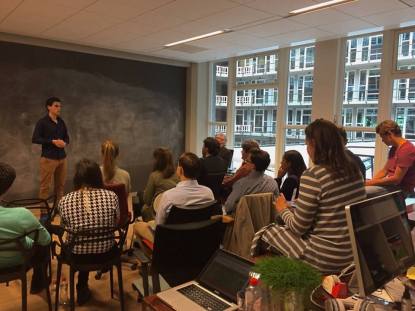Yesterday evening I hosted a colloquium about the quarter-life crisis. The initiative was generated via the Soul Start-Up, a platform I’ve been setting up with a couple of friends for the past year. The aim of the evening was to talk about the quarter-life crisis and how it manifests itself, personally. During the many interesting discussions, two things became clear for me: first, your intrinsic motivation – or volition as I like to call it – largely depends on what you can do for others; and second, to better cope with a negative response from others and other kinds of disappointments we need to develop some kind of mental defensibility.
So what is this thing called ‘quarter-life crisis’ anyway? Well there are many different interpretations of this peculiar crisis. One of the original interpretations referred to the dilemma of young graduates in chosing between an available but poorly paid internship or joining the queue for a more worthy junior position. It’s true that the labour market for graduates has been better but the current situation is far from unique. In the late 1970’s, proper positions were hard to get as well due to the stagnating economy. Every period has its ups or downs, where ours unfortunately belongs to the latter category. It’s interesting to see the difficulty we are experiencing in the process of finding a job – including myself, as I received yet another negative result from a job application that morning. What is even more intersting, though, is the amount of attention we spend on an issue that seems temporary at best, and feels like a classic first-world problem at worst.

There is more to the quarter-life crisis than mere worries about job prospects. It is about finding your volition and trying to act upon it as much as possible, including, but not restricted to, your (future) job. One aspect that was addressed several times was the idea that your volition depends on what you can do for others. This notion is close to the concept of altruism: doing something good for other people without having the expectation to get something in return. Many participants shared the observation that their volition is enhanced when they are able to be of service to others. Ironically then, as individuals we are driven by the unconditional help towards the people in our community – either close friends or family, colleagues, or even complete strangers. In a world where it’s apparently all about me and my ambitions, the thought that we derive motivation and meaning from others is quite striking.

If this is indeed the case, then you need to be prepared for when others do not value your good intentions as much as you do. According to Jan Andreae, one of the speakers at the colloquium, we have to develop some kind of mental defensibility in order to accept the outcomes of our actions and move on. For example, writing these bi-weekly blog posts enhances my volition because I can provide some interesting insights to others. I am activated by the idea that I can reach out to people and share my thoughts with them, whatever they may be. However, the desired effect could also stay out, for people might not read my posts or speak badly about the whole enterprise. No matter the outcome it is important to keep up the spirit and adapt if needed. To be honest, I am a bad loser in the sense that I tend to get cynical about setbacks. Nevertheless, I know that this is no solution because the possibility to act upon my volition also requires me to deal with disappointments.
Perhaps the quarter-life crisis is just a fancy term for something that reflects an essential and timeless question: how are people motivated? I believe we will make some headway in answering this question if we would stop focusing on what we want or need as individuals, and instead pay more attention to what we can do can in the service to others.
